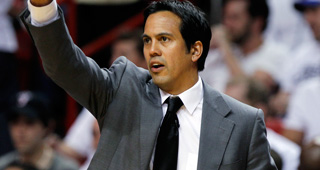After having struggled to score and stop Tony Parker, the Miami Heat went to the tape and the drawing board in order to make their movenow that they had an idea of how their opponent intended to play them.
Erik Spoelstra and his coaching staff did a fantastic job over the weekend coming up with solutions to the two things that hurt their team the most in Game 1: scoring the ball, and stopping Parker from penetrating their defense and either scoring or dishing the ball for good looks.
After having scored a mere 88 points (1.035 points per possession) in Game 1, the Heat finished with 103 points (1.241 PPP) in Game 2 and did so without having a single player reach 20 points.
Dwyane Wade came in aggressive from the tip and scored all 10 of his total points in the first half. Chris Bosh played very well, scoring 12 efficient points by spotting up from 18 to 20 feet instead of camping out on the three-point line, and grabbed 10 big rebounds, his first double-digit rebounding game since May 10, when he grabbed 19 rebounds against the Chicago Bulls in Game 3 of the Eastern Conference Semifinals.
LeBron James was a ghost in the first half, scoring four points on 2-for-6 from the field, tying a career-low for points in a half in The Finals. He finished the game with 17 points, eight rebounds and seven assists. Granted, the four-time MVP was not shooting well at all throughout the entire game, but we must credit Kawhi Leonard for not only taking on the challenge of defending James, but doing so very, very well. He was out-hustling James very well in the first half especially, grabbing nine rebounds in the first 24 minutes, five of which were offensive.
As for Mario Chalmers, not enough can be said for how he played in Game 2. The Heat’s starting point guard took it upon himself to score the ball when the opportunity presented itself, taking advantage of all the attention directed at James and scoring eight of his 19 total points in the paint.
With James shooting so poorly, the question remains, how did the Heat manage to lead by as many as 27 points in this game?
The two keys to the massive 33-5 run bridging the third and fourth quarters by Miami were the pick-and-roll with James as the screener and Chalmers being the primary ball-handler, and the lockdown defense they played in the second half, forcing 17 turnovers and converting them into 19 points. The former completely threw the Spurs off, as LeBron as the screener makes the Heat much more unpredictable. San Antonio, primarily Leonard and Green, became very hesitant in their defensive rotations, unsure whether to help on the handler or stay with James.
Going to this offensive set opened up the game for Miami as the game went on, and allowed LeBron to find himself offensively in the second half, driving the lane and making the tough outlet passes to his shooters as soon as the Spurs converged on him. The Heat have shot very well from the arc in this series after being stifled from long-range by the Bulls and the Indiana Pacers, including 10-for-19 in Game 2.
According to ESPN Stats & Info, 16 of Miami’s 33 points during the big run came from “Chalmers handling & LeBron James screening”.
Looking at the game from a defensive standpoint, the Heat did a great job all-around. The key to their defense was limiting Tony Parker to 5-for-14 from the field and forcing him to turn the ball over five times in contrast to his zero turnovers in Game 1.
Miami did an excellent job of mixing it up on Parker all night long, throwing body after body on him and being physical, constantly changing the match-ups. They also double-teamed him time and time again in pick-and-rolls, which resulted in traps that led to deflected passes and easy transition points or challenged shots.
Chris Andersen did a great job of helping contain the Spurs’ floor general, sagging off Tim Duncan when Parker would drive or when San Antonio ran their Parker-Duncan screen-and-rolls. Long, athletic, and quick on his feet, he stifled the Spurs’ rhythm as Parker could not get going.
Bosh was also a major factor defensively, helping challenge Duncan’s shots and denying him to get into position by fronting and being physical. Consequently, the Spur recorded his worst playoff game in his fifteen-year career, with nine points on 3-for-13 shooting.
For Miami, this was not only a great game, but a reassuring one. The coaching staff proved not only to their fans and their team, but to themselves, that they can make adjustments when needed.
Offensive adjustments, check. Defensive adjustments, check.
Your move, Pop.


